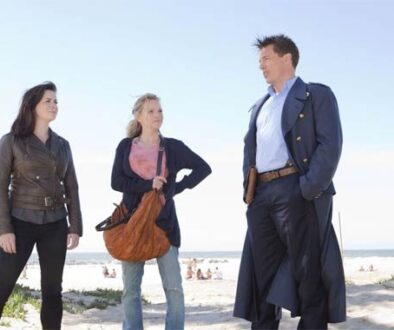Torchwood: Miracle Day Episode 3 Review

Clint Hassell reviews Dead of Night, the third episode of Torchwood: Miracle Day.
Thank you, Buffy Summers, for saving Torchwood! Or, more accurately, thank you Buffy the Vampire Slayer writer/producer Jane Espenson for writing an episode that made me forget the travesty of last week’s “Rendition
Despite the new characters, the team of Jack, Gwen, Rex, and Esther are beginning to feel like classic Torchwood. Perhaps this is due to the recurrent use of familiar scenes. For example, Rex’s questioning of Friedkin and the team’s subsequent getaway mirrored the teaser of “Ghost Machine,” complete with Esther filling Toshiko’s role of guiding them from off-site via computer surveillance. Also, as in Children of Earth, a scene was dedicated to a team member presenting newly-purchased clothes, equipment, and food to the rest of the team-in-hiding. Yes, in Miracle Day, the set-ups are simple, but I love how they mirror previous events while reflecting current conditions.
The scene where Jack photographs Rex changing clothes was hilarious. Again, the good-natured ribbing demonstrates that these four disparate individuals are beginning to come together as a team, and I appreciate seeing clever jokes in scenarios not specifically tailored to service a specific punch line. “You’ve done that before.”/“So many times” may actually have replaced “What’s his dabbling like?”/“Innovative . . . bordering on the avant garde” as my favorite exchange in the history of Torchwood.
I also love how, unlike in “Rendition,” so many of the small plot points in “Dead of Night” make sense. Of course, Gwen knows how to take out a cop car – she was once a police constable (Dear Santa, please bring me one of those tire-slashing welcome mats for Christmas. I’ve been a very good boy this year. Love, Clint). Also, Gwen is worried about Anwen, and, though she realizes the importance of discovering the source of the “miracle” and of who is trying to kill the Torchwood team, she is still peeved at Rex for extraditing her and Jack to the U.S. Of course, Esther would watch TV all day – it’s what she does as an analyst. Yes, it does provide the script writers a way to fill the viewing audience in on important details, but it’s not a screenwriting shortcut because it has been introduced so organically into the script (i.e., it’s not as if Alan Jackson is suddenly revealed to have written the never-before-mentioned Armageddon virus). Further, Jack is smart to realize that he is more likely to discover the culprit behind the “miracle” by looking at who has profited the most, and not by finding a mad scientist-type. Finally, it makes sense that Rex would begin to show cracks in his steely veneer right after being betrayed by his former CIA instructor. He is used to working inside a powerful system, and suddenly he is without support or resources.
I also loved how several key scenes in “Dead of Night” are deftly written to reveal many layers of character development. For example, in the scene where Esther programs her sister’s phone number into her new mobile handset: (1) Rex’s explosive temper is shown to be at least partially the result of the pressure he feels to follow protocol exactly, (2) Esther is shown to think more with her heart, (3) the audience is reminded that the team is underground and on the run, and (4) future drama with Esther’s sister is foreshadowed. When Esther stands up for herself and Rex admits that she does a good job, (5) his character is humanized and his stony persona is revealed to be a mask, while (6) the backstory of the working relationship between Rex and Esther is fleshed out – a far cry from the feckless dialogue while making EDTA, in a coffee pot, on a plane, in “Rendition,” no?
Another key scene involves Esther quoting Robert Frost’s “Acquainted With the Night” – a poem about depression and guilt – as it relates to the “miracle.” Though I criticized the referencing of Tithonus by Jim the lab tech as “pompous and pretentious and unrealistic,” I praise Esther’s dialogue here because it portrays her awkward attempts to make small talk with someone she barely knows. The scene also reveals that Esther is beginning to question deeply her own existence, and her place on the team, a nice distinction from Gwen’s reaction to becoming a new team member in Series 1. The best part of the scene is that Gwen makes fun of the reference: “Yeah, the poets are the ones who are really gonna suffer, aren’t they?”
I appreciated that, as a TV newscaster reports that the Supreme Court will consider adjusting the “life sentences” of convicted felons who will now live forever, Oswald, in his hotel room, begins to realize that he is still a prisoner, albeit in a different form of cell. (On a side note, why does he still have a police escort? He may need protection, but it would not the responsibility of the police to guard him.)
I love that, just a week after I suggested that Lyn’s final fate would have been more effective if her hyoid bone had been crushed, leaving her gasping for air, rather than her neck broken, the exact scenario played out with a patient of Dr. Juarez.

Finally, I am in awe of the post-coital, drunk-dialed phone call between Jack and Gwen, which, while referencing events from previous series, took their relationship to an entirely new level. With Gwen now immortal, a truly vulnerable Jack asks, “We’re good, aren’t we, you and me?” In his past, Jack has left so many things unsaid – relationships abandoned, apologies untendered – which is easy, if you are immortal. Seeing Jack so physically and emotionally exposed (no pun intended), and seeing Gwen’s guilt over Ianto’s death was the important follow-up to Children of Earth that I have been seeking. Further, the conversation destroyed a major aspect of the Torchwood mythology – the Jack-Gwen-Rhys love triangle. While I applauded the Series 1 storyline where Gwen responded to the rush of excitement at joining Torchwood and expanding her mind to the secrets of the universe by cheating on Rhys with Owen, Gwen is both married and a mother now. For her to cheat on Rhys would destroy all goodwill her character has engendered from the audience; she’d be a horrible person and a bitch. Further, an affair would reduce Rhys’ character from fully-developed partner to cuckold, a definite step back from Rhys’s character arc from “Meat” though “The New World.” No, the love triangle, though classic Torchwood, is no longer appropriate – the characters have grown and developed beyond this storytelling device – and so it is dispatched as Gwen chooses a video chat with Rhys and Anwen over consoling Jack.
The best thing about this week’s episode of Miracle Day is that it left me pondering deeper questions, some unrelated to Miracle Day’s main plot. Normally, I hate being left with questions – usually a sign of a poorly-written episode with too many plot holes or incongruities – but Espenson’s “Dead of Night” has had me mulling over several queries all week long.
For example, who are the Soulless? They say that everlasting life has robbed mankind of their souls, but what exactly are they protesting? What change are they hoping will occur, and how will wearing a mask and marching silently with candles affect that change? To where are they walking?
A doctor on Juarez’s medical panel states that genetic anomalies are no longer self-aborting, which raises the question, does Russell T Davies consider “life” to begin at conception? The answer is slightly muddled because, while one doctor states that, “No baby is a mistake,” Juarez responds, “Yeah, I was a Catholic too once. I got better.”
With every episode narrated by a Greek chorus of newsreaders, I keep asking, where is Trinity Wells? She’d be the perfect addition to this American cast! Further, where is Dr. Martha Jones-Smith? Surely, with her medical background, her tenure with both Torchwood and UNIT, and her experience with Owen’s resurrection glove-bestowed immortality, she deserves at least a cursory mention. Or is she to busy hunting Sontarans with Mickey?
As established in “The New World,” Rex and Dr. Juarez do not share a previous history. Why then would this strong, independent, capable woman wish to have sex with someone who, so far, has been an insufferable patient, bossy, misogynistic, and who has called her only for drugs and medical advice? Somewhere in time, Emmeline Pankhurst is choking on her laser spanner.
Metanec, the fictitious painkiller produced in mass quantities by PhiCorp in advance of the “miracle,” is described as being non-narcotic. The drug is not described as being non-addictive. Could the “miracle” be a way to create a world of addicts, a ongoing market base for PhiCorp’s drugs? At first, my thought was no, because anyone who had become addicted to the drugs because of some mortal wound would be dead once the miracle reverses itself (and let’s be honest, of course that’s how Miracle Day will end – R.I.P. Rex and Gwen’s dad!). But would this necessarily be the case? Wouldn’t the “miracle” provide many people the time needed to heal through their injuries? Such a storyline would provide fascinating commentary on the state of prescription drugs in America, but would that feel like a letdown on a show that brought us Weevils and the 456? Do we still need for this show to be about aliens? (The episode did make it’s third reference to an “intervention or, at least, an influence from beyond this world,” in as many weeks.)
If it is aliens, I hope it’s the Daleks, in retaliation for Jack’s involvement in the events of “The Parting of Ways.” The Daleks can’t attack Rose, as she’s living with Ten, on Bad Wolf Bay, in another dimension; they can’t attack Nine because he looks a lot like Eleven now, and they’re Technicolored anyway. But Jack? How awesome would it be to have a completely unannounced, unspoiled, surprise twist of the Daleks appearing, sans Doctor, to settle a score with Jack. Yes, yes, I know it’ll never happen, but it makes my inner fan boy go “Squee!” in the inside.








